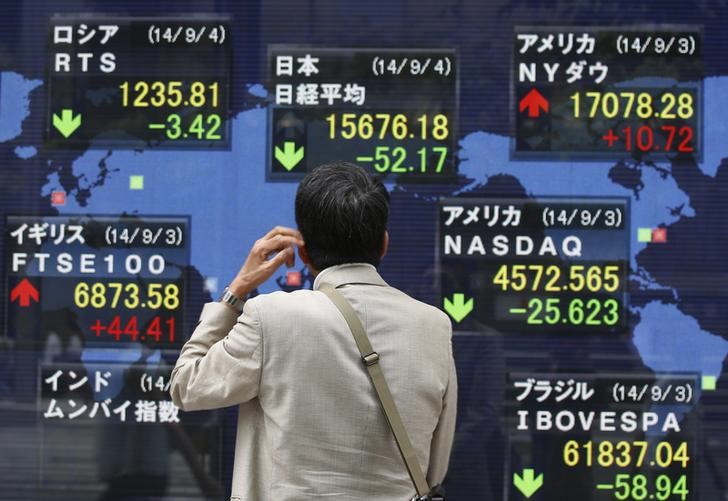By Shinichi Saoshiro
TOKYO (Reuters) - Asian stocks gained and the dollar stood tall on Wednesday thanks to surprisingly robust U.S. economic growth, helping investors head into the Christmas holidays in a more relaxed mood after the global market turbulence of the past two weeks.
Risk appetite was sharpened by from revised data showing the U.S. economy grew at 5.0 percent in the third quarter, the quickest pace in 11 years and the strongest sign yet that growth has decisively shifted into higher gear.
That drove both the Dow (DJI) and the S&P 500 (SPX) to record closing highs overnight.
MSCI's broadest index of Asia-Pacific shares outside Japan (MIAPJ0000PUS) gained 0.2 percent. The Shanghai Composite Index (SSEC) bucked the trend and shed 2.6 percent as profit-taking seen earlier in the week appeared to gain momentum. [.SS]
South Korea's Kospi (KS200) was up 0.4 percent and Tokyo's Nikkei (N225) rallied 1.2 percent.
"America's strong economy is pushing the dollar up and the yen down, and that's a big plus for Japanese exporters to the U.S.," said Hiroyuki Nakai, chief strategist at Tokai Tokyo Research Center.
The strong U.S. GDP prompted markets to bring forward the timing of a likely hike in interest rates by the Federal Reserve, which last week gave an upbeat assessment of the economy.
The bullish outlook pushed up Treasury yields and gave an already strong dollar fresh momentum. The two-year U.S. Treasury yield (U.S. 2-Year Bond Yield) rose to a high not seen in almost four years in light of raised interest rate expectations.
The greenback fetched 120.320 yen <USD/JPY>, edging closer to a 7-1/2 year peak of 121.86 yen touched earlier this month. The euro sank to a fresh 28-month low of $1.2165 <EUR/USD>.
"Risk appetite is returning at a faster pace than expected, thanks to the temporary pull-back in Russia risk and a well-balanced statement from the Fed last week," said Junichi Ishikawa, market analyst at IG Securities in Tokyo.
However, given thin holiday trading conditions and continued instability in crude oil prices, equities and currencies could be volatile, he said.
The Russian ruble plunged to an all-time low in mid-December on the back of lower oil prices and Western sanctions, which make it almost impossible for Russian firms to borrow from the West.
The ruble has since regained some lost territory, shored up by informal capital control measures designed to head off a repeat of the inflation and protests that marked Russia's 1998 financial crisis.
Weighed by industry data that showed a surprise build in domestic stocks, U.S. crude oil dipped 38 cents to $56.74 a barrel
"It's ironic. The U.S. economy is starting to boom and crude oil prices are contracting in the opposite direction," said Ben Le Brun, market analyst at Sydney's OptionsXpress.
Gold traded close to a three-week low as the improved sentiment dampened investor appetite for the safe-haven metal. [GOL/]

Spot gold
(Additional reporting by Thomas Wilson in Tokyo and Keith Wallis in Singapore; Editing by Shri Navaratnam)